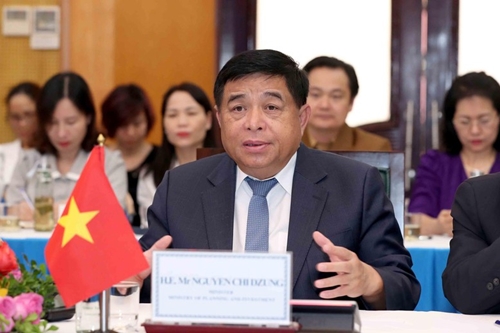The formation of the cooperation committee follows discussions during Korean President Yoon Suk-yeol’s state visit to Vietnam in June 2023, where the importance of SME cooperation was highlighted. The committee is expected to foster mutual understanding among entrepreneurs and enhance collaboration in sectors where both countries have significant strengths.
    |
 |
|
MPI Minister Nguyen Chi Dung speaks at the event. (Photo: baochinhphu.vn) |
During Prime Minister Pham Minh Chinh's visit to the RoK in July 2023, an MoU on SME and startup cooperation was signed, anticipated to create new opportunities for investment, trade, and business connections, contributing to innovation and sustainable development in both countries.
At the meeting, MPI Minister Nguyen Chi Dung expressed confidence that the committee's activities, supported by research institutes and SME associations, will lead to effective joint projects, particularly in high-tech agriculture, food processing, pharmaceuticals, semiconductors, and electronics. He also highlighted the importance of integrating Vietnamese SMEs into the RoK and global supply chains, reaffirming the ministry’s commitment to supporting business development.
The meeting served as a platform to discuss the development of SMEs in both countries and identify key areas for future support. Vietnam's Ministry of Planning and Investment encouraged the RoK businesses to expand investments in areas where the RoK excels and Vietnam has high demand, such as the digital economy, green economy, and emerging industries like semiconductors, AI, and hydrogen.
Minister Oh Young Joo of the Ministry of SMEs and Startups recognized the significance of the meeting as a step toward a new chapter in bilateral cooperation, expressing his hope for concrete plans to implement the MoU.
The RoK, a major investor in Vietnam since the 1990s, had invested nearly 87.5 billion USD across over 10,000 projects as of June 2024, making it Vietnam’s top investor.
Recently the RoK’s investments increasingly shifted toward high-tech industries, energy, finance, and high-quality services, reflecting a move from traditional manufacturing to more advanced sectors.
Vietnamese SMEs, meanwhile, are progressing in technology adoption and innovation, gradually climbing in the global value chain and forming partnerships with Korean companies.
The potential of Vietnam's SMEs spans various sectors, including manufacturing, electronics, agriculture, food processing, IT, textiles, and footwear.
Source: VNA